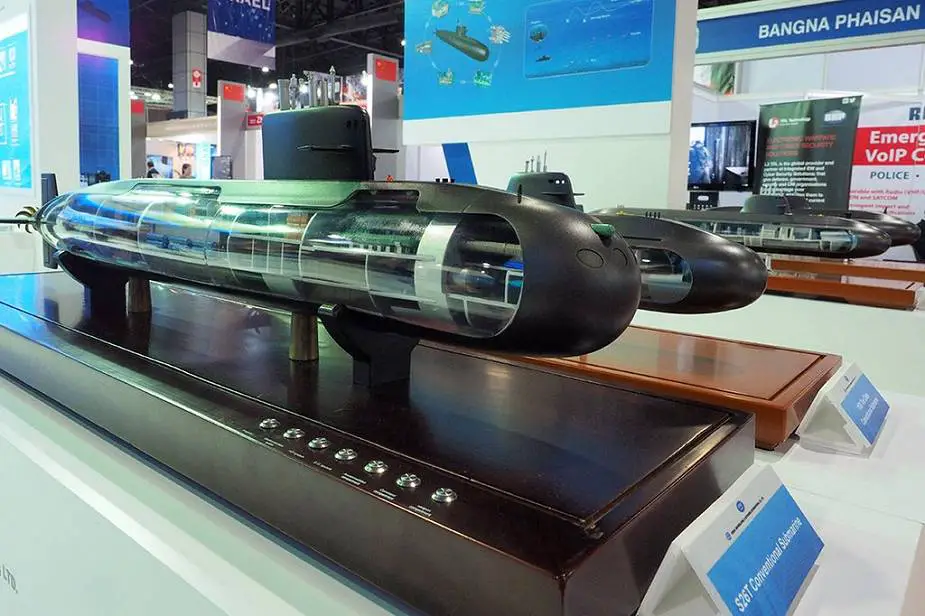Amid concerns about the missing German engines in Chinese submarines, Thailand’s Prime Minister, Prayut Chan-o-cha had warned in April that the planned procurement deal with China could be shelved if Beijing was unable to fit the engines specified in the original purchase agreement.
The EurAsian Times had reported that the German engine manufacturing company Motoren- und Turbinen-Union (MTU) had refused to supply MTU396 diesel engines to China to be fitted into the S26T Yuan-class submarine being built for the Royal Thai Navy (RTN).
To resolve the issue, the Royal Thai Navy and China Shipbuilding & Offshore International Co (CSOC) have scheduled a meeting on June 9 to settle the dispute, Thai media outlet Pattaya Mail reported.
The vice president of CSOC is due to meet with Navy Chief of Staff Admiral Tharoengsak Sirisawat to discuss the situation.
The Chinese firm has asked the Royal Thai Navy to change the contract to allow it to employ a Chinese-made alternative, such as the MWM 620, which it claims is of comparable quality.
The Royal Thai Navy, on the other hand, is sticking to the contract’s original provisions, which it feels are non-negotiable.
Thailand PM Pratyut warns China that Thailand will scrap deal to buy Chinese submarines, if China is unable to fit German engines on them, as Thai Navy does not want inferior Chinese MWM 620 engines as an alternate.
— WLVN🔍 (@TheLegateIN) April 5, 2022
Negotiations on the issue were initially set to take place in May but were repeatedly postponed due to the Covid-19 situation in China. According to observers, CSOC may give the Navy revised terms to complete the contract.
However, if no headway is made, the agreement could even be terminated.
“What do we do with a submarine with no engines? Why should we purchase it?” Prayut had told journalists in April. The submarine that China wants to outfit with its home-grown engines is expected to be delivered in 2024.
Under the terms of the agreement, China Shipbuilding & Offshore International Co (CSOC), a state-owned shipbuilding conglomerate, is supposed to build and sell three advanced export variants of Type 039B Yuan-class submarine – to be called the S26T – for a total cost of 36 billion baht (1.16 billion) to be paid in 11 annual installments.
Will The Deal Fall Through?
The Thai government approved the purchase of three Yuan-class submarines from China for $1.05 billion in April 2017. However, due to budget constraints, the purchase of only one submarine was allowed — valued at $403 million, while the other two were shelved.
While Germany bypassed the terms of the European Union embargo by taking advantage of some loopholes, it had to terminate the dealing after an investigation exposed how Germany was violating a comprehensive EU arms embargo and benefiting China, a common European adversary that has been challenging its power.

After the abrupt suspension of German engine delivery, China reportedly offered reverse-engineered Chinese-made engines certified by German MTU to the Thai Navy.
However, the Thailand officials rejected the offer, insisting that the Chinese side adheres to the original terms of the agreement. They also turned down the Chinese offer to transfer two of its decommissioned submarines, according to Thai PBS World.
The Chinese have demonstrated well-known capabilities in reverse engineering technology obtained by foreign countries to develop their system. However, the dearth of examples of home-grown propulsion technology could be understood as the object of Thailand’s doubt regarding Chinese engines.
Even though Thailand has indicated that terminating the purchase will not affect bilateral relations, China’s inability to equip the submarine with the original engine could risk future submarine sales. The explanation for this is simple: German engines are not coming and new Chinese engines are not trustworthy yet.
Will Thailand Accept China’s Offer?
While China has made significant advances in engine manufacture for fighter jets such as the J-20 and wind tunnels for hypersonic technologies, it lags far behind in submarine propulsion.
Since the majority of engines used in Chinese submarines are foreign-made, propulsion engineering is one of the military industry’s most serious weaknesses.
The Song and Yuan-class attack submarines, for instance, which account for the majority of China’s conventional submarine fleet, are powered by MTU 396 SE84 series diesel engines manufactured in Germany.
Professor Andrew Erickson of the US Naval War College’s China Maritime Studies Institute (CMSI) said at a 2015 conference on the Chinese Navy’s capabilities that propulsion engineering in the PLAN’s [People’s Liberation Army Navy’s] underwater force is still a work in progress.
Due to diesel engines that are specifically designed to minimize vibration and noise to avoid sonar detection, diesel-electric submarines are far stealthier than nuclear submarines. MTU Friedrichshafen GmbH of Friedrichshafen, Germany’s 396 SE84 series of state-of-the-art diesel engines, for example, power both the Song– and Yuan–class attack submarines.
According to The Diplomat, each Song and Yuan–class battleship has three of these engines, which have been built under license by Chinese defense contractors since 1986.
The Yuan-class submarines are also thought to be equipped with Stirling air-independent propulsion and quieting technologies from Russian-designed submarines.
It has made some advancements in reverse engineering in the past few years; however, the Chinese engine has been rejected by the Thailand authorities despite the certification received by MTU. As of now, the deal hangs in the balance, and so does China’s standing as a regional exporter of arms.
- Contact the author at sakshi.tiwari9555@gmail.com
- Follow EurAsian Times on Google News